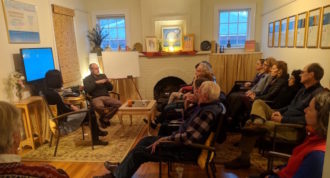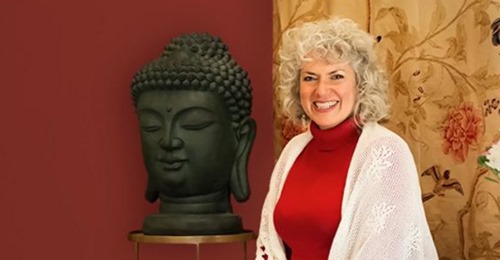Type the words “stressed,” “anxious” or “depressed” into a social media post — and who hasn’t in the last year? — and within seconds, ads for meditation apps will fill your feed with the soothing soundtrack of a gurgling mountain brook. Among names like Headspace, Reflectly and Meditopia, the Calm app currently reigns supreme, with more than 100 million downloads and the No. 1 position in the Apple App Store’s Health and Fitness category.
Meditation is hot, and the connection among the mental, emotional and physical challenges brought on by the COVID-19 pandemic and a surge of interest in the practice is clear. Still, the benefits of meditation are not news to local therapists, practitioners and teachers.
Ronya Banks, founder and lead teacher at Asheville Insight Meditation, has trained all over the world and practiced for over 30 years.
Tom Ball, who runs the Asheville TM Center with his wife, Jeanne Ball, has been teaching since he was 21, over 50 years ago.
Sarah Wood Vallely, author and mindfulness teacher, has been around meditation her entire life. “My parents were both meditators, and as a child I was going to ashrams,” she says. She began teaching meditation to children 20 years ago when she was an elementary and high school art teacher. “It was quite a phenomenon back then,” she recalls. “People who didn’t have children came to my classes to see what I was doing because it was such a novel thing.”
On the rise
While apps have made meditation more accessible recently, Tom Ball says he has seen a steady rise in interest in transcendental meditation over the last decade. He points to increased scientific research and real evidence of the benefits. “When I first started teaching in 1971, my teacher had one scientific study to point to,” he says. “Now there are over 800 studies in scientific journals on TM, which have really helped medical professionals and laypeople see it’s not just a woo-woo thing of imagining you’re a butterfly landing on a flower. There is real evidence of benefits.”

Among them, says Banks, are reductions in stress, anxiety and depression; lower blood pressure; and soothing the flight, fight or freeze part of the brain. Meditation affects regions of the brain associated with feeling calm, peaceful and loving, she says, and is good for memory and focus.
“Being a human is hard,” Banks says with a laugh. “But add a pandemic that can kill you and your family, the fear and anxiety that causes, plus isolation, loneliness and depression, remove all the outlets and resources for nurturing we normally have, and it’s a recipe for mental health disaster.”
Depending on the severity of their depression, anxiety and insomnia, many people turn to medication for relief, says Kris Hanvey, psychiatric nurse practitioner and founder of Asheville Holistic Health. “In 2020, I prescribed more pharmaceuticals than any other time in memory. I like to think of prescribing medication as the last resort, though depending on acuity — which has risen in response to the pandemic — you sometimes start with that. Insomnia is not necessarily worse since COVID, but the desperation for relief is far greater.”
In therapy, depending on the individual patient, Hanvey offers various forms of counseling, healing (she is a reiki master) and meditation. Noting that many people believe “they can’t do meditation,” she often begins with a guided body scan, helping the patient focus on sensations in every part of the body starting with the feet. After that warm up, she helps the person segue to other forms of meditation.
Banks says when people tell her they can’t imagine sitting still or quieting their mind for any length of time, she responds, “Welcome to the human race. We all have a reality show going on in our heads. If we could naturally meditate, there would be no reason to learn. It takes time, patience and practice.”
What’s on your mind?
In a study released in November 2018, the federal Centers for Disease Control and Prevention identified mindfulness meditation as the fastest-growing popular wellness practice, having seen a more than threefold increase in users between 2012 and 2017.
Simply stated, mindfulness is being mindfully aware of the present moment, according to Banks. “You may notice you have an obsessive planning mind, so rather than pushing it aside, you explore it with curiosity and what sensations it causes. Fear? Anxiety? Worry? Bringing loving awareness to that obsession can reduce those feelings, like letting air out of a really taut balloon,” she says. “Mindfulness can heal patterns that cause fear and anxiety.”
For Tom Ball, mindfulness is about keeping the mind engaged in an open way. Unlike forms of meditation that focus on breathing or a mantra, he says, “you’re monitoring the content, watching thoughts come and go and trying not to react or hold onto them.”
Tom and Jeanne Ball specialize in another type of meditation, automatic self-transcending or transcendental meditation, which is characterized by a brain wave pattern called alpha1, Tom explains. In this state, he continues, the mind is restfully awake and exhibits the deepest measures of physiological rest.
“But really, they’re all great,” he enthuses. “Every time we hear someone is doing any kind of meditation, it’s wonderful. Closing your eyes, getting centered, it’s the right direction and a good start. Meditation is becoming more mainstream and that’s beautiful.”
Tweaking the model
Jeanne Ball says people who come to TM have often tried other types of meditation. “They may be frustrated or want to go deeper. Just because you have not been successful with other forms of mediation doesn’t mean you can’t transcend. People transcend naturally, listening to music or watching a sunset, but don’t know how to get it back. They need a technique to get there.”
The TM Center has altered its teaching protocols to adapt to COVID, though the personal instruction process is the same as it has been for 50 years. Currently the four-day course begins with a 90-minute one-on-one class at the Chestnut Street center, which teaches enough of the technique to allow a student to begin to meditate at home. The next three classes — taken on consecutive days — are done remotely via an app created by the International TM Foundation, followed by a Zoom meeting with either Tom or Jeanne to check in and answer questions.
“So far, everyone is really happy with this,” says Tom. “We were surprised because we have done in-person teaching for 40 years, but people are experiencing the same benefits, which is great because otherwise we would not be teaching right now.”
The Asheville Insight Meditation building has been closed to on-site groups since March. With the exception of some social gatherings outdoors during the warmer months, all other in-person activities have been on hold. But online daily morning meditations and guided group mediations with a themed presentation such as a recent one on “letting go” have been taking place for months, and that method has its advantages. “Now that it’s virtual, I am seeing people from all over the world. It’s opened up our center in ways we never did before,” Banks says. She also offers one-on-one virtual sessions to teach people how to meditate.
Vallely now certifies teachers, counselors and life coaches to teach mindfulness through her program, TSD Mindfulness; a new book, Tame Soothe Dwell; retreats; and a podcast. Though she no longer teaches meditation to children, her books geared to them, including Sensational Meditation for Children, are still available at sarahwood.com, where parents can also find sample meditations for children. “Children are typically more open to mediation than adults,” she notes. “The top benefit for them is social, being able to become more mindful of their feelings and actions when around others.”
Make it routine
Hanvey says she had slipped out of her own daily meditation practice when COVID first hit. “I found myself in kind of a bad mood though, so I made a commitment to resume. Routine and ritual are the things to start with. Habits have to be created with anything to be effective.”
Meditating at the same time and place with the same objects around her each day helped Hanvey restart her practice. She suggests setting a stopwatch rather than a timer. “Just turn it on when you start, turn it off when you stop, and log it. The next day, do the same. You will find yourself doing it longer each day.” She also found an online group she joins every morning for an hour.
Essentially, she just urges people to give it a try. “People who are into apps can start there,” she says. “One of the silver linings of COVID is meditation groups have been opened to everyone via Zoom, so you don’t have to feel self-conscious. Just carve out a week where every day you sit, light a candle, bring relics meaningful to you. It could be 30 seconds. That’s OK. Start the habit, and when it becomes a habit, life tends to open up.”




Before you comment
The comments section is here to provide a platform for civil dialogue on the issues we face together as a local community. Xpress is committed to offering this platform for all voices, but when the tone of the discussion gets nasty or strays off topic, we believe many people choose not to participate. Xpress editors are determined to moderate comments to ensure a constructive interchange is maintained. All comments judged not to be in keeping with the spirit of civil discourse will be removed and repeat violators will be banned. See here for our terms of service. Thank you for being part of this effort to promote respectful discussion.